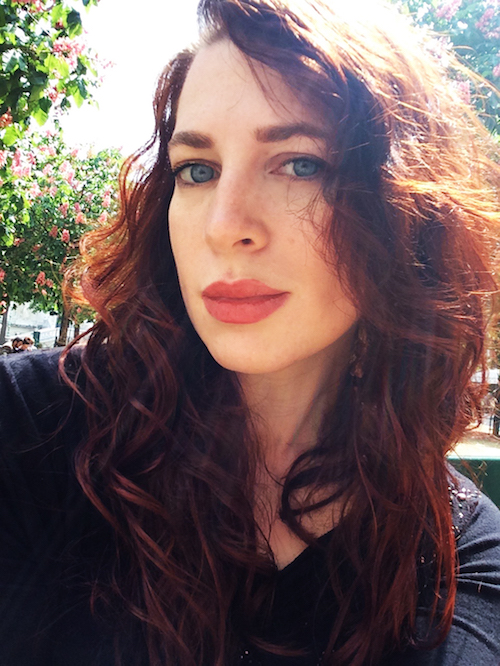Object-Oriented
by Arkady Martine
Edited by Julia Rios
March 2018
I’m staring at the skew on the third floor of an incredibly beautiful eighteenth-century building when I burst into tears again. The floor isn’t a floor anymore–it’s slid sideways, I can see the place where the load-bearing beams have snapped inside the structure. There’s a joint in it now, a discontinuity, and I’m going to have to designate this one for demolition even though it’s covered in blackwork fresco painting, a tumble of Art Nouveau whorls and loops, the hair of laughing women, grapes and flowers. This place has been here, being art and being useful–there’s a sign on it, it’s been a bank and a retail front and a residential building–for three hundred years at least, a beautiful marker on this square that the people who used it probably didn’t even notice seeing any more and–and now I am going to mark an X on my spreadsheet and it will be rubble by tomorrow.
Earthquakes. More often now. And it’s not safe, with a skew like that, to ever let anyone back inside. I should know: a long time ago I was an architect, and now I’m an evaluator for post-disaster safety. I specialize in earthquakes, but I see a lot of floods, too. Floods fuck up architecture so badly. The mold alone, you know? The wood rot.
So I’m crying, hard enough to blur the screen of my tablet. This beautiful place, wasted. Everyone on my team–David, humanitarian aid, Victoria, medical, and the other structural engineer, Alyosha–ignores me. First of all, I do this all the time. It’s embarrassing as shit, I want to cringe thinking of myself, but I can’t help it and it sneaks up on me. All that building ever wanted was to be a building, to do work, to be art here in this little city. And now it is broken. Wasted. Useless.
Besides, my teammates cry too. Not usually at buildings, that’s my thing, buildings and machines sometimes, but they cry. We all do, all of us volunteer evaluators. The empathy drugs turn everything up. I just was object-oriented to start with. It used to be a psychological condition. Now it got me this job.
Around the middle of the last century, right when climate change stopped being a warning and started being an endless rolling disaster with punctuated nasty peaks, people finally started noticing how brilliantly good humans are to each other in a crisis. In a true disaster, humans will put their own lives on the line for their neighbors. They’ll volunteer their skills, they’ll act cooperatively, they’ll basically form perfect little anarcho-syndicalist communes until they can collectively claw themselves back into a condition of late capitalist consumerism. Get the lights back on. Retreat into their houses and their streaming media and be so profoundly grateful to not to have to care about their neighbors anymore. The first post-disaster evaluators were really volunteers: locals, community members dealing with the empathy-spike of devastation, putting their skills to use.
We’re not so different, me and my team. It’s just that we have help staying like that. Chemical help to stay in the spike. For weeks and weeks and weeks, disaster after disaster, all over the world. I’ve racked up so many hours in planes–we’re some of the only people who get unlimited air travel anymore–and it’s always somewhere new. Faultlines. Frack lines. And the empathy drugs to keep us company, keep us the best kind of human being. They started out as an MDMA derivative, but the big aid organizations have chemistry departments and they’ve focused it down from that generalized love-in. One little pill in the morning, sometimes another in the evening if we have to keep working without sleep, which is usually how it goes. Disasters take a long time to evaluate, even if we’re getting good at knowing how a community gets wrecked.
I mark my X on the pad. It chimes, and some asshole with a bulldozer, somewhere, starts his engine to take down this poor building. I’m still crying. One of my teammates (it’s David, it’s always David when one of us gets visibly not-okay, David feels about people the way I do about the built environment) puts his hand on my shoulder. I almost drop the tablet.
“Marisol,” he says, “do you need a break?”
I bury my face in his shoulder. Some of his dreadlocks fall over my cheek, keep the sun off me.
“There’s another eighteen blocks just in this neighborhood,” I say, “I can’t take a break. It’s not done. It’s not safe. For the community.” That last bit is for David–I can feel him flinch, and hold me tighter. “I’ll be fine.”
I won’t be–I’m probably going to cry all afternoon and have the worst headache in the morning. Choke down my dose of empathy with weak coffee and antacids. But it’s not done. The earthquake here might be over–might not be, they’re coming in twos and threes lately, ever since Mexico City–but the cleanup’s not over, and this is my community for as long as I’m on site. I feel it. I feel it so much. I can’t help it.
David lets me go–he’s crying now, too, the fucker, but we cry at the slightest provocation, especially when we’re near each other–and pats me on the shoulder, and says, “Maybe the next one won’t have to be condemned,” which is nice of him to say.
I volunteered for this job, you know? I really did. In my right unaltered mind and everything, without a single bit of chemical help. I volunteered because it was the right thing to do. And now it’s always the right thing to do. We don’t burn out, exactly. Not exactly.
But there’s always new faces on the team, when one of us stops showing up. Humans are amazingly resilient. Turns out.
